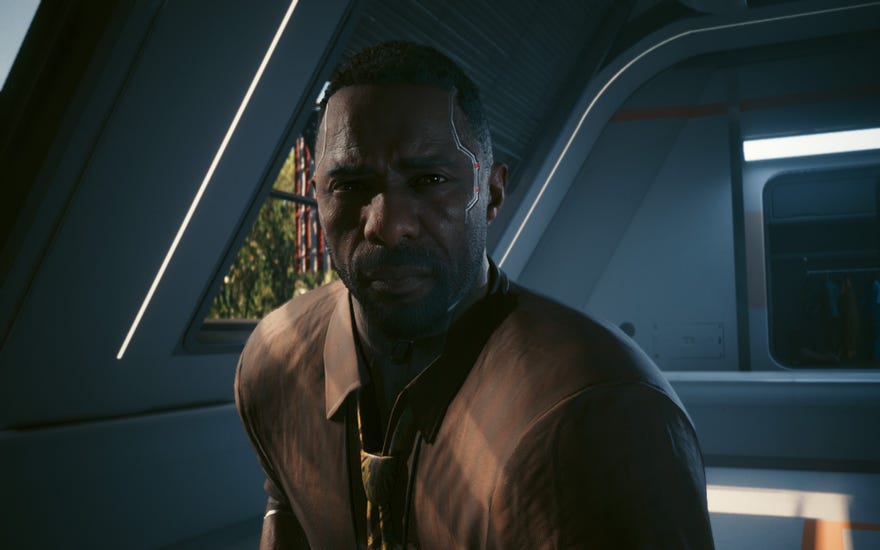Cyberpunk 2077's new ending is its most heartbreaking, and worth returning for
Careful what you wish for
"I am most moved and always have been by stupid courage — the kind when, against all odds, the hero just keeps going," William Goldman once said. This is a thing Goldman I have in common. To help you tell us apart, a point of difference between Goldman and I is that he expressed his love of stupid courage by writing Butch Cassidy And The Sundance Kid, whereas I express mine by really liking Cyberpunk 2077.
Stupid courage is a trait that CD Projekt Red's first-person RPG seems to admire, but that's never more clear than in a new ending to the base game added by the Phantom Liberty expansion. It shows what happens when the heroes reject stupid courage and choose self-centred pragmatism instead. Spoilers for Cyberpunk 2077 and Phantom Liberty throughout.
I already had my canonical ending to V’s story back in 2020, found among the six or so different endings Cyberpunk 2077 had at launch. Phantom Liberty’s story takes place before that ending happens, and nothing about your spy adventure with Idris Elba prevents you from later pursuing those original endings.
On the rare occasion that I replay a game, that’s normally exactly what I’d do. I might watch the alternate endings for a game on YouTube, to see what else I could have won, but if I’m in control myself I can’t help but repeat all the same choices. Anything else creates a gnawing sense that something is terribly wrong about reality, and I’m forced to reload a save to correct it.
Phantom Liberty has its own four distinct endings, governed by your choices, and I was satisfied with how my story went and happy to imagine my original Cyberpunk 2077 ending followed on from there. But journalistic curiosity demanded I try the new base game ending for myself. I’m glad I did.
Final warning: spoilers for Cyberpunk 2077’s many endings begin now.
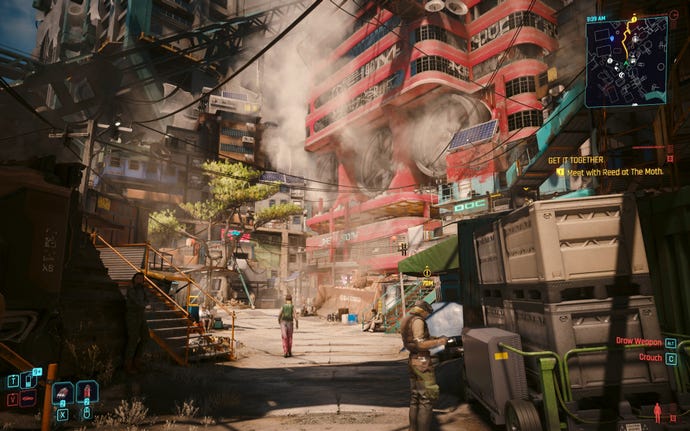
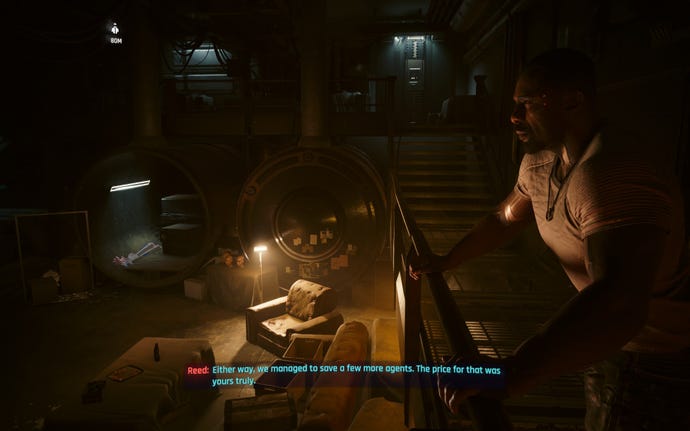
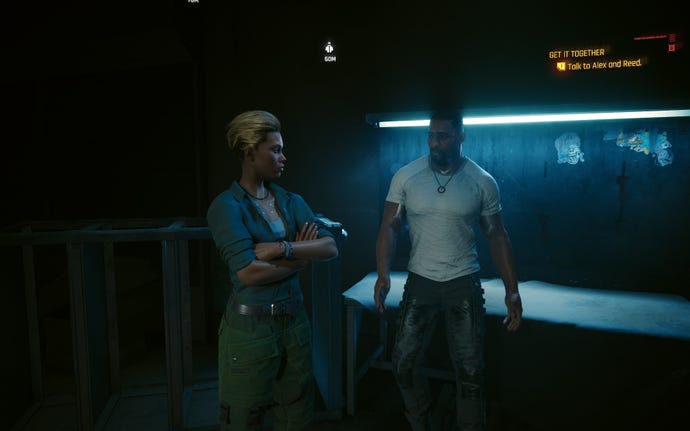
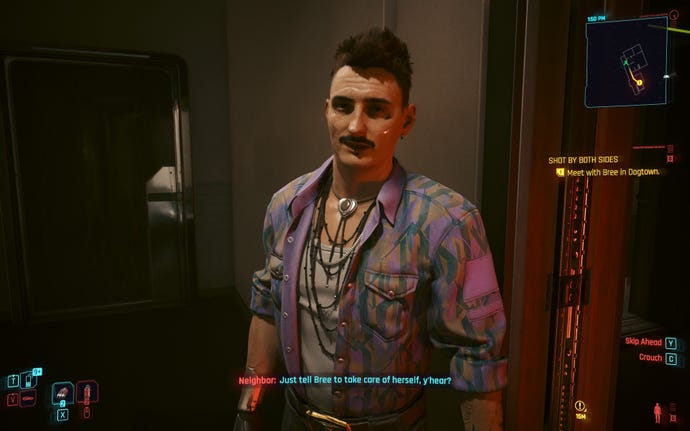
Cyberpunk 2077 features a point of no return in which V goes to visit Hanako, the heiress to the Arasaka family business now under threat of assassination by her brother. How the game proceeds from that meeting is decided by V in conversation with Johnny Silverhand on a rooftop overlooking Night City.
You can assault Arasaka tower with Johnny alone, you can bring one of a selection of friends along to help depending on which missions you pursued earlier in the game, or you can end the entire thing then and there on that rooftop. Whatever you choose, the consequences are well-handled: from final phone calls to loved ones to explain your decision, to the sentimental chat with Johnny, to the cascade of consequences that can follow.
Cyberpunk 2077’s new ending bypasses these endings entirely: you don’t meet with Hanako, and you don’t assault Arasaka tower. Side with Idris Elba’s Solomon Reed at the very end of Phantom Liberty and hand over traitorous hacker Songbird to the FIA, and the government spooks will follow through on their offer of removing the chip in your head. The chip that’s killing you, and the one that contains the recreated Johnny Silverhand.
As choices go, this is lawful evil at best. Songbird is dying, too, and is desperate to escape the New United States government which wields her as a weapon. Handing her over is to doom her to a life of exploitation and to eventual death.
For that reason, it’s not the choice I made initially. I shot Idris Elba in the head and placed Songbird on a rocket to the moon, where people wait who can maybe cure her. I did this despite knowing that Songbird had lied when she initially suggested this cure was a two-person deal that could save me, too. As noted, I like stupid courage. Rescuing Songbird and killing Reed closed off one route towards V’s salvation, but I don’t think V would sacrifice someone in a similar position to herself, to save herself. I think she’d keep fighting.
If you choose differently from me and hand over Songbird, however, you unlock a new ending to the base game. This ending begins with Reed - now haunted by having handed Songbird over to the NUSA - telling you that the doctors are ready to operate on you. This operation turns out to have two major consequences.
First, it kills Johnny Silverhand.
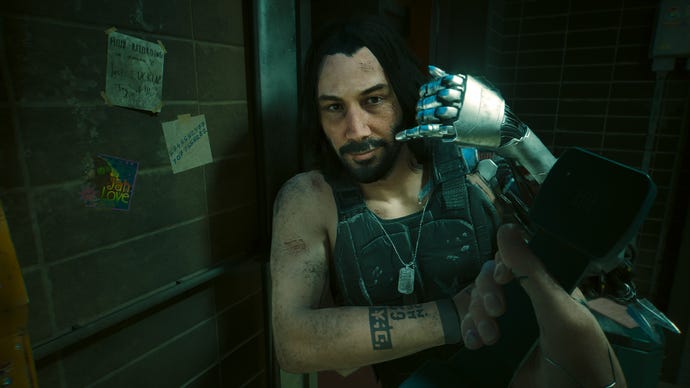
If you’ve only played a little of Cyberpunk 2077 - or even if you’ve played a lot, frankly - this might not sound like a bad deal.
The relationship between V and Johnny begins, and can remain, antagonistic. V doesn’t appreciate the deadly invader in her brain, and Johnny was an asshole in life who hasn't been mellowed by decades trapped on a USB stick. He'll pop up during missions to comment on V's actions - which are, after all, your choices - and to tell you what he would do. What he would do varies, but it's normally rooted in a belief that people suck, coprorations suck worse, and the solution is to flip everyone the bird and - as he did in his life - try to Snake Plissken the lot.
He’s not necessarily someone you feel a lot of sympathy for, then. I’d argue that one of Cyberpunk 2077’s real strengths however is that it’s one of the few games with characters who have real arcs. The trick, I think, is to ignore Johnny’s advice for much of the game and instead approach Night City’s denizens with trust and kindness. Do this and Johnny will mock you, at first, but eventually he comes to respect your principles, and then to reflect on his own life. This culminates in a series of missions in which you help Johnny give closure to some of his old friends, and maybe make amends.
Believe me or not, suffice to say that by the end of sixty hours with Cyberpunk 2077, I felt like Johnny and I were buds, and not just because the in-game relationship meter had ticked upwards. Making the choice to kill him didn’t feel great.
Depending on your relationship with Johnny, it might not feel great to him either. You'll have a final conversation on the airship on the way to the hospital, with Johnny either giving his blessing if he likes you, or chewing you out but ultimately forgiving you.
Either way it's crushing, although I think the latter dialogue wins for pure devastation. Plenty of games end with heroic sacrifice, but far fewer end with the deeply unheroic sacrifice of another, and Johnny’s sadness and particularly his forgiveness ruined me. Stick “Row” by Jon Brion on repeat and go stare out a window for a while.
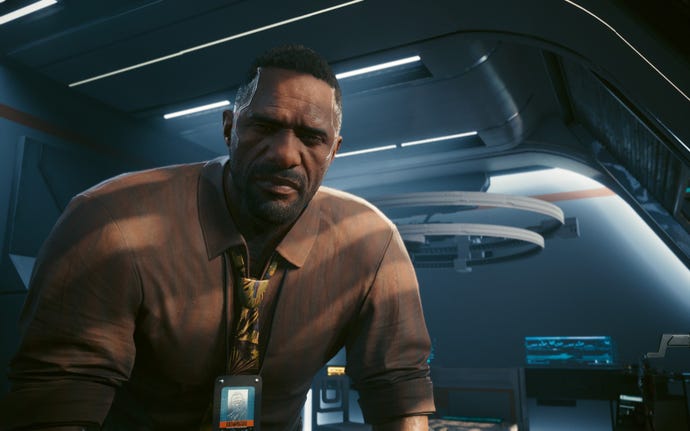
The next thing that happens is you wake up in a hospital bed with Solomon Reed waiting for you. He explains that the operation was successful - hooray, you’re no longer dying. Also it’s now 2079 and you’ve been in a coma for two years, and the damage to your nervous system caused by the operation means you can never use cyberware ever again. V’s old life is completely gone - and there’s no way to get it back.
To prove it, you call your old friends. Some are happy to hear you’re alive, but they didn’t put their lives on hold in case you miraculously returned from wherever you disappeared to for two years. Judy has left Night City, for example, and is now happily married in Pittsburgh.
I returned to Night City to see if Viktor could fix me, a trip that begins with a long drive in the back of a Delamain cab. You can look out the window at the changed city streets and listen to radio reports about which faction is up and which is down. It all amplifies the feeling of alienation from the city you once called home.
Viktor can’t fix you either. Worse, Viktor has changed, too, having been threatened by Night City’s political shifts and surrendered his business to one of the big corps. You can challenge him on this heel turn, but as he explains, he just didn’t see what was to be gained by continued resistance. Much like V, he chose pragmatism - and at this point who are you to judge.
Viktor wants to hang out with V, but your conversation is cut short by the arrival of a new merc, with her own preem mods that need repairs.
V’s journey in Cyberpunk 2077 is split between looking to extend her life and looking to build a legacy, and I think you could mistake this ending as a warning against over-prioritising the former. I don’t think it is, though. Siding with the FIA means V is forgotten by Night City, but the real price you pay for pragmatism is that V is left behind by her friends. It feels like a warning against selfishness rather than an argument that it's better to burn out than fade away.
Then V gets beaten up, not by hyper-modded criminal masterminds, but by some petty street thugs outside Viktor’s shop. Without cyberware, V has no way to defend herself anymore.
At this point, this ending feels like It’s A Wonderful Life’s second act only it's not a dream, or Shawshank Redemption’s double-secret original ending where Andy dies in a pipe full of shit. I really wished Johnny Silverhand would appear and insult me.
Cyberpunk 2077 is about people who are doomed, but it's never so nihilistic as to end things at their lowest. Battered unconscious in an alleyway by those thugs, V is again woken to find an old friend standing over her. It’s Misty, Jackie’s girlfriend.
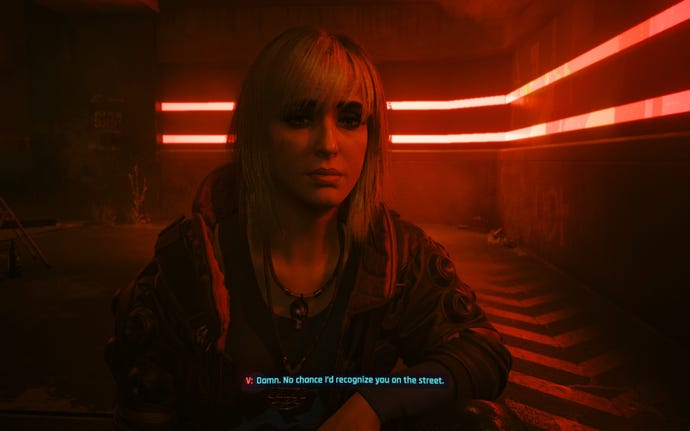
As one of Cyberpunk 2077’s few characters without mods, Misty is uniquely placed to understand V's new life. She gives V a talk about what it means to be one of the regular people; not a legend of the Afterlife, but a face in the crowd - and the potential that comes from that anonymity. The final shot of the game is V blending into that crowd, walking down the street of Night City until lost among all the other pedestrians.
I’ve thought about this ending a lot since I played it three weeks ago, trying to decide whether I find it hopeful. V’s old life is gone, but that final conversation makes clear that there is plenty of potential in the life that lies ahead. If what you wanted was for V to give up her life of crime, this might feel like a victory.
To me, the costs are far too high. My headcanon V ending remains that of my first playthrough, in which I saved Johnny, in a sense, and left myself with still only six months to live, but fought on. There were other personal costs to those decisions, but I prefer to imagine V acting humanely towards others and stubbornly fighting to survive, than sacrificing others to save herself.
But I don’t regret making different decisions so I could experience Cyberpunk 2077’s new ending for myself. It solidified all the thoughts I already had: that Cyberpunk 2077 isn’t much interested with what it means to be human after you've got robot arms, but that it is deeply concerned with what it means to be a good person in a corrupt world - and that it normally offers answers with which William Goldman would improve.
